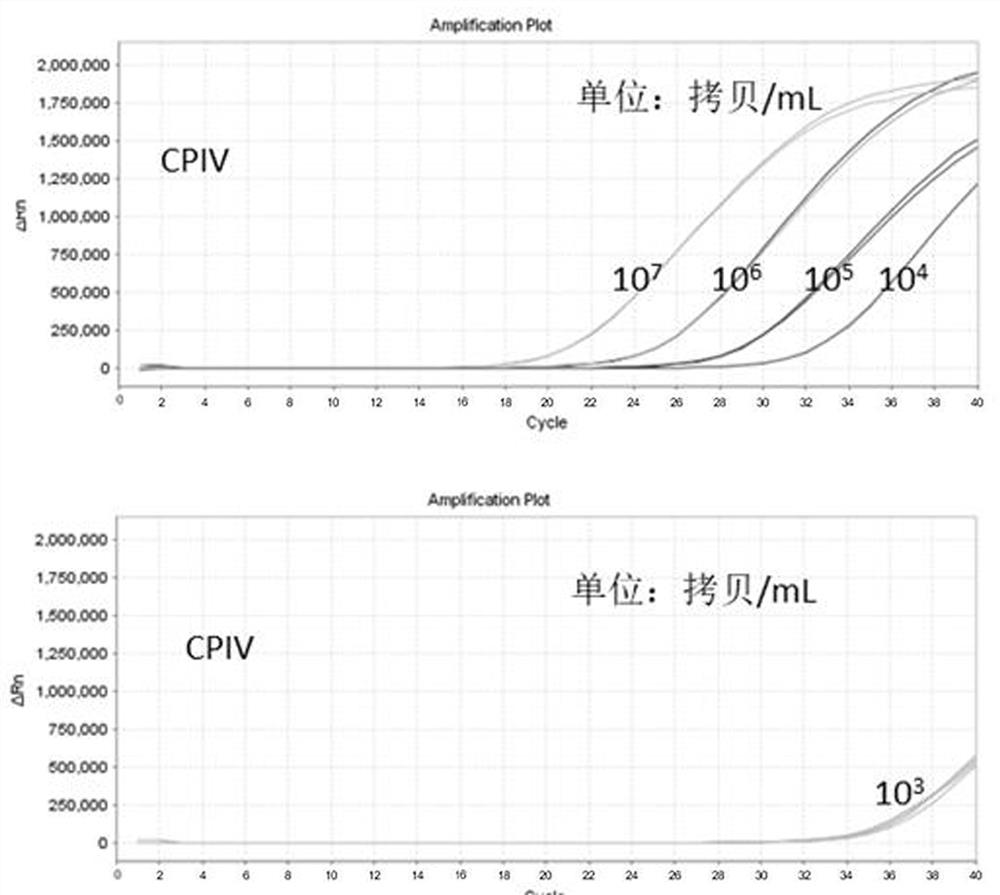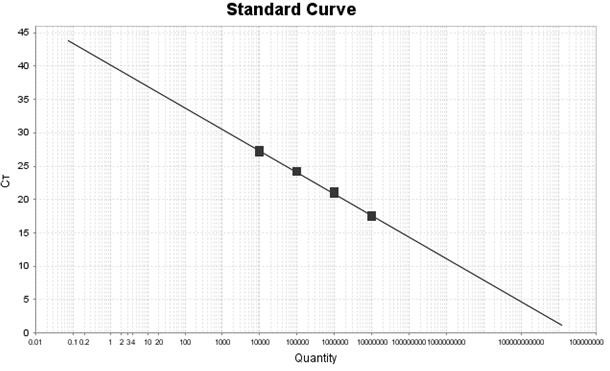Primer-probe composition, kit and preparation method for detecting canine parainfluenza virus, canine adenovirus type Ⅱ and Mycoplasma canis
A canine parainfluenza virus, canine adenovirus technology, applied in biochemical equipment and methods, recombinant DNA technology, microbial assay/inspection, etc., can solve the problems of unfriendly pathogen identification, poor sensitivity, low sensitivity, etc., and achieve optimization Reaction system and procedures, avoid false positive results, and improve the effect of detection throughput
- Summary
- Abstract
- Description
- Claims
- Application Information
AI Technical Summary
Problems solved by technology
Method used
Image
Examples
Embodiment 1
[0047] Example 1 A primer probe of a nucleic acid detection kit for canine parainfluenza virus, canine adenovirus type II and Mycoplasma canis
[0048] The gene sequences of CPIV, CAV-II, MC and Arabidopsis thaliana SUC2 were obtained according to the NCBI GeneBank database, the gene sequences were compared, and the following primer probes were designed:
[0049] SEQ ID NO.1: the upstream primer designed for canine parainfluenza virus, the sequence of this upstream primer is 5'-cgatggctttgaggagggatc-3'; CPIV-F1 for short;
[0050] SEQ ID NO.2: the downstream primer designed for canine parainfluenza virus, the sequence of this downstream primer is 5'-tgtcaggtagatcttctgcaagtg-3'; CPIV-R1 for short;
[0051] SEQ ID NO.3: A fluorescent probe designed for canine parainfluenza virus, the sequence of the fluorescent probe is 5'-cataggcattgatctctccacggctcatacc-3'; CPIV-P1 for short; the 5' end of the fluorescent probe is labeled as a reporter group 6-FAM, the 3' end is marked with th...
Embodiment 2
[0062] Example 2 Preparation method of nucleic acid detection kit for canine parainfluenza virus, canine adenovirus type II and Mycoplasma canis
[0063] Step 1. Prepare negative and positive controls
[0064] Negative control is TE Buffer;
[0065] Positive control: Insert the CPIV target gene sequence, CAV-II target gene sequence, and MC target gene sequence into the pUC 57 vector plasmid, respectively, and obtain CPIV synthetic plasmid, CAV-II synthetic plasmid, MC through expanded culture, identification and plasmid extraction. Artificially synthesized plasmids. The CPIV target gene sequence is shown in SEQ ID NO.13; the CAV-II target gene sequence is shown in SEQ ID NO.14; the MC target gene sequence is shown in SEQ ID NO.15.
[0066] The CPIV synthetic plasmid, CAV-II synthetic plasmid, and MC synthetic plasmid were quantified to 3 × 10, respectively. 6 After copy / mL, mix them according to the volume ratio of 1:1:1 to make a positive control. In the obtained positive...
Embodiment 3
[0079] Example 3 Kit Linearity, Sensitivity, Repeatability and Specificity Detection Experiment
[0080] Step 1. Template preparation
[0081] Insert the CPIV target gene sequence, CAV-Ⅱ target gene sequence, and MC target gene sequence into the pUC 57 vector plasmid respectively, and obtain CPIV synthetic plasmid, CAV-Ⅱ synthetic plasmid and MC synthetic plasmid through expanded culture, identification and plasmid extraction. . The CPIV synthetic plasmid, CAV-II synthetic plasmid, and MC synthetic plasmid were quantified to 1 × 10, respectively. 7 copies / mL.
[0082] The CPIV target gene sequence is shown in SEQ ID NO.13; the CAV-II target gene sequence is shown in SEQ ID NO.14; the MC target gene sequence is shown in SEQ ID NO.15.
[0083] Will 1x10 7 The copies / mL of CPIV synthetic plasmid, CAV-II synthetic plasmid and MC synthetic plasmid were diluted to 1×10 with TE Buffer respectively. 6 Copy / mL, 1×10 5 Copy / mL, 1×10 4 Copy / mL, 1×10 3 Copy / mL, spare.
[0084] Ta...
PUM
| Property | Measurement | Unit |
|---|---|---|
| correlation coefficient | aaaaa | aaaaa |
| correlation coefficient | aaaaa | aaaaa |
Abstract
Description
Claims
Application Information
 Login to View More
Login to View More - R&D
- Intellectual Property
- Life Sciences
- Materials
- Tech Scout
- Unparalleled Data Quality
- Higher Quality Content
- 60% Fewer Hallucinations
Browse by: Latest US Patents, China's latest patents, Technical Efficacy Thesaurus, Application Domain, Technology Topic, Popular Technical Reports.
© 2025 PatSnap. All rights reserved.Legal|Privacy policy|Modern Slavery Act Transparency Statement|Sitemap|About US| Contact US: help@patsnap.com



